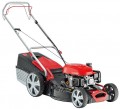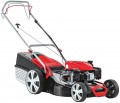Grass ejection
Direction of ejection of grass cut by the lawnmower.
The main options for the direction of ejection are back or sideways; there are also models in which you can choose the direction. At the same time, we note that in classic units, the ejection back is almost always carried out
into the bag(up to the point that when the bag is removed, the hole is automatically covered with a lid), but when the bag is ejected from the
side, it may not be — this is convenient, for example, when mulching ( see above).
Also note that riders (see "Type") have their own specifics: in units with rear discharge, after removing the bag, it is necessary to install a special plug, and then the cut grass will simply remain under the deck. In some
mini-tractors, a similar way of working (without a bag) is provided initially; it is also considered a rear ejection, although the grass does not flow backwards, but downwards.
Motor model
Model of the engine installed in the lawn mower. The main performance data of the engine is usually indicated in the general data for the unit. However, knowing the exact name of the motor, you can find more detailed information on it — from specific data to reviews and reviews. Also, data on the engine model can be useful when searching for spare parts or consumables.
Engine size
The size of the engine installed in the petrol or diesel model (see "Engine type"). Power directly depends on this indicator, however, only engines of the same type can be compared by volume (see "Type of internal combustion engine"). And even in the same type of units of the same power, the volume can be different. In such cases, note that a larger volume means more fuel consumption, but the engine itself may cost less than a smaller one.
Motor power
Lawnmower engine power expressed in horsepower. The common unit of power these days is the watt, but gasoline and diesel engines (see "Engine Type") are traditionally referred to as hp. Some units are easy to convert to others: 1 hp. approximately equal to 735 watts.
In general, the more powerful the engine, the more performant the mower is and the better it handles with heavy work such as cutting thick grass, bushes, etc. On the other hand, high power has a corresponding effect on fuel consumption, as well as the weight and price of the engine. In addition, it should be taken into account that different types of mowers (see "Type") differ in terms of power requirements. For example, among trimmers there are many models with a capacity of
0.7 – 1.3 hp., for gasoline lawn mowers, the minimum power is already in the range of
1.3 – 2 hp., and for
mowers,
at least 2.5 hp is required. . So you can only compare units of the same type in terms of power. Detailed recommendations for choosing a mower depending on its type and features of the planned work can be found in special sources.
Motor power
Lawnmower engine power expressed in watts. This designation is used absolutely for all electric models (see "Engine type"), and it is also often found in gasoline and diesel units along with horsepower (these units are clearly related, 1 hp is about 735 watts).
In general, the more powerful the engine, the more performant the mower and the better it will cope with heavy work such as cutting thick grass, bushes, etc. On the other hand, high power has a corresponding effect on fuel / electricity consumption, as well as the weight and price of the engine. In addition, note that the power requirements depend on the type of mower itself and its engine (see above for both). For example, for most
robots, the power
does not exceed 500 W — more, taking into account specialization, is not required, besides, otherwise the devices would turn out to be too bulky and heavy. Trimmers and lawn mowers of similar power are only electric, and the power limit for power tools is
2500 – 3000 W when powered from the mains and
1500 – 2000 W for battery models. But in gasoline tools, the minimum power is about
500 – 1000 W for trimmers and
1000 – 1500 W for mowers; the maximum value can exceed
4 kW.
Detailed recommendations for choosing a lawn mower d
...epending on its type and features of the planned work can be found in special sources.
